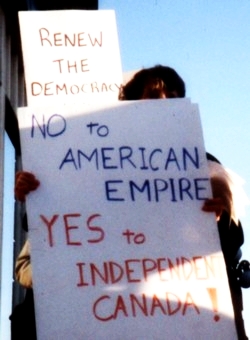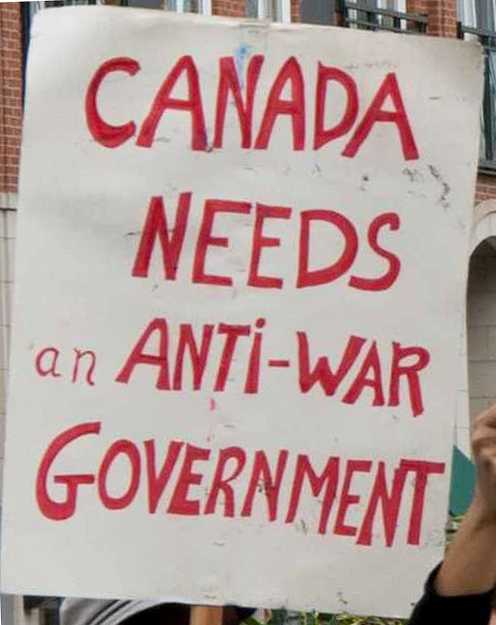For Your
Information
Who Said What About Prime Minister's
Trip to Washington
A February 10 Globe and Mail report said,
"Prime
Minister Justin Trudeau intends to forge a personal connection
with Donald Trump playing to the U.S. President's central
campaign themes of job creation and a secure America when the two
leaders sit down at the White House on Monday." A "senior
official" told the newspaper that Trudeau will not "criticize the
President's executive order temporarily banning Syrian refugees
and immigrants from seven Muslim-majority countries."
"They are very much into job creation," the senior
official
said. "They want to talk about how we are going to create jobs in
the U.S., but the reality is the way to help create jobs in the
U.S. is to have us work together rather than working at cross
purposes."
 Trudeau said at an event in
Yellowknife on February 9,
"We're
going to talk about all sorts of things we align on, like jobs
and economic growth, opportunities for the middle class -- the
fact that millions of good jobs on both sides of our border
depend on the smooth flow of goods and services across that
border. But I am sure issues of security will also come up and I
look forward to having very productive and constructive
discussions." Trudeau said at an event in
Yellowknife on February 9,
"We're
going to talk about all sorts of things we align on, like jobs
and economic growth, opportunities for the middle class -- the
fact that millions of good jobs on both sides of our border
depend on the smooth flow of goods and services across that
border. But I am sure issues of security will also come up and I
look forward to having very productive and constructive
discussions."
Minister of Transportation Marc Garneau, also chair of
the
cabinet committee on Canada-U.S. relations told media that the
visit will be "a high-level meeting where we talk about the
things we share in common. As time goes on, we'll get down into
more specific areas in the different files that are important to
the two countries."
"The prime minister has said he will convey our values
to the
president of the United States and that's fair. And President
Trump will do likewise. We will talk about what we have in
common, but on occasion we will also make the point that we have
a different way of looking at certain things," Garneau said. He
said that both Trudeau and Trump have a priority to "create jobs"
but that "We are negotiators just like the other side. They
expect that from us and we expect that from them." The main
message will be that "We've got a good arrangement going, and
let's keep it going," Garneau explained.
Minister of Finance William Morneau said on February 9
that
the Trudeau and Trump governments share the same aims. "I'm
focused on creating a better outcome for Canadians and
Americans," he told media. Covering up that the governments of
both countries serve the oligopolies, not the people, Morneau
added: "What the U.S. administration is trying to achieve --
good-paying jobs for Americans -- is consistent with what we're
trying to achieve. We've got a much more positive starting point
that we can work from."
On February 6, Canadian Minister of Defence Harjit
Sajjan met
with the new U.S. Secretary of Defense James Mattis at the
Pentagon. Sajjan's official statement following the meeting read,
"The close defence relationship between our two nations provides
both countries with greater security in North America and
contributes to peace and stability in the world in increasingly
complex and uncertain times."
Sajjan pointed out that 2018 will mark the 60th
anniversary
of the North American Aerospace Defense Command (NORAD), and said
that he was "pleased to highlight the importance of this unique
partnership and its success in protecting North America." Sajan
and the U.S. Defense Secretary "also discussed multilateral
issues, including our pledges to lead battle groups in support of
NATO's enhanced forward presence in Eastern Europe, our
commitments to the United Nations and the Summit of Defence
Ministers that Canada will host later this year. We discussed our
training missions in both Ukraine and Iraq and the work being
done by the Global Coalition to degrade and defeat Daesh. I also
took the opportunity to discuss Canada's Defence Policy Review,"
Sajjan said.
 Mattis told media that the reason his first
phone call
to a
foreign counterpart was to Canada's Minister of Defence was due
to the close military relationship between the two countries,
which he said he experienced personally in Afghanistan. He did
not say that this close relationship included the Canadian forces
being directed by the U.S. Defence Secretary to turn over
prisoners to the U.S. torture machine behind the back of Canada's
Prime Minister at the time, Jean Chrétien. Revealing how the
crucial issues of war and peace are not permitted to be subjects
of deliberation within the polity, Sajjan, in response to media
questions about how the Trump administration will handle
international crises, merely said, "We will always work together
with our closest ally in dealing with challenges ... We've done
it in the past, and we will continue to do it now." Mattis told media that the reason his first
phone call
to a
foreign counterpart was to Canada's Minister of Defence was due
to the close military relationship between the two countries,
which he said he experienced personally in Afghanistan. He did
not say that this close relationship included the Canadian forces
being directed by the U.S. Defence Secretary to turn over
prisoners to the U.S. torture machine behind the back of Canada's
Prime Minister at the time, Jean Chrétien. Revealing how the
crucial issues of war and peace are not permitted to be subjects
of deliberation within the polity, Sajjan, in response to media
questions about how the Trump administration will handle
international crises, merely said, "We will always work together
with our closest ally in dealing with challenges ... We've done
it in the past, and we will continue to do it now."
In response to questions about Trump and others
advocating
torture, Sajjan simply repeated worn-out false ideological
beliefs. "When it comes to our military and Canadian values, we
follow international law and Canadian law. Canada will never use
torture or be party to that. ... I've worked with the U.S.
military, and they too have the same structure and values as us,"
Sajjan had the effrontery to say. Unchallenged by a democratic
media with the interest to seek truth from facts, Trudeau and his
Ministers repeat such FIBs with impunity.
On February 7 and 8 Canada's Minister of Foreign
Affairs
Chrystia Freeland attended meetings in Washington, DC with U.S.
Secretary of State Rex Tillerson, Speaker of the U.S. House of
Representatives Paul Ryan, the Chair of the Senate Committee on
Armed Services, Senator John McCain and Chair of the Senate
Foreign Relations Committee Senator Bob Corker. Global Affairs
Canada says the meetings covered "a broad range of topics,
including mutually beneficial security and economic ties between
Canada and the U.S."
According to Global Affairs, Freeland's meeting with
the U.S.
Secretary of State "underlined the importance of the economic
relationship between their countries, which supports millions of
middle-class jobs on both sides of the border. They also spoke
about the balanced and mutually beneficial trading relationship
between Canada and the United States, as well as about softwood
lumber." Discussions also "addressed security cooperation,
continued support for NATO, the global fight against Daesh, the
future of Syria and the situation in eastern Ukraine, among other
international issues."
Paul Ryan said he and Freeland "had a productive
conversation
about how we can enhance these ties, including by strengthening
NATO and improving dairy market access."
Commenting on the upcoming visit, NDP MP Nathan Cullen
said
Trudeau "has to speak truth to power." Instead of upholding a
single principle which might recommend him to Canadians, he
pushed pragmatic nonsense. "Simply lying down and hoping that he
doesn't notice us is not the strategy to use with Mr. Trump.
We've seen people try to placate him in the past -- other
Republicans, Democrats -- it doesn't work," Cullen said.
Conservative MP Gerry Ritz, whose fame resides in destroying the
Canadian Wheat Board under Harper, took the opportunity to
disagree. Trudeau should not go "overboard. ... At the end of the
day, that's our major trading partner. We have to work with them
on a day-by-day, hour-by-hour business," Ritz said.
A Toronto Star commentary by Chantal
Hébert adds her
two bits to the fray: "Notwithstanding some hyped-up headlines,
Canada's international partners are not looking for the leader of
a middle power such as Trudeau to lead an international
counteroffensive against Trump. They would be just as happy -- if
not more -- to see their Canadian counterpart emerge as a
moderating influence on the president," says Hébert.
An article in iPolitics by Stephen Maher says
that
Trudeau cannot denounce Trump's executive order banning citizens
of seven Middle Eastern and North African countries from entering
the U.S., "But neither can he take the approach of Japanese Prime
Minister Shinzo Abe, who during his news conference with Trump on
Friday [February 10] completely dodged the question, blandly referring
to it as
a domestic matter." All these journalists like to hear themselves
spout nonsense. Stephen Maher inappropriately uses the word
"bland" to describe calling this ban as a "domestic matter," but he
does not offer any principled position either.
Andrew Coyne of the National Post also adds his
two
cents, saying, "I'd prefer that my prime minister spoke up for
what is right, even at some cost to Canada's economic interests
-- just as one would hope he would with respect to China, or
Russia, or any world power. That doesn't require that he be
needlessly provocative. ... To defend our interests, as much as
our values, we will have to start setting boundaries early --
picking our battles, yes, but firmly and patiently asserting our
rights. And if we are to do so effectively, we will need to do so
in concert with other countries."
 It was left to Bruce Heyman,
former U.S. ambassador to
Canada, to give perspective to what is going on. "I wouldn't
worry about the dangers. I think it's an opportunity. Once
there's this understanding that we protect North America
together, through NORAD and NATO ... this is readily apparent:
that the Canadian relationship is one of the -- if not the most
-- important relationship the U.S. has in the world." It was left to Bruce Heyman,
former U.S. ambassador to
Canada, to give perspective to what is going on. "I wouldn't
worry about the dangers. I think it's an opportunity. Once
there's this understanding that we protect North America
together, through NORAD and NATO ... this is readily apparent:
that the Canadian relationship is one of the -- if not the most
-- important relationship the U.S. has in the world."
Conrad Black told CTV News that he thinks Trudeau
should
express openness to doubling Canadian defence spending to two per
cent of GDP, in line with what the U.S. asks of NATO members. "If
Justin can say something to the effect that we'll move in that
direction over the next couple of years, that will be a real plus
point. And incidentally, they are both very charming, personable
people. They'll get on like smoke, I think," Black said.
Adam Radwanski of the Globe and Mail said that
the
"best-case scenario, from Ottawa's perspective, has to be as
uneventful a Monday as possible."
Website: www.cpcml.ca
Email: editor@cpcml.ca
|